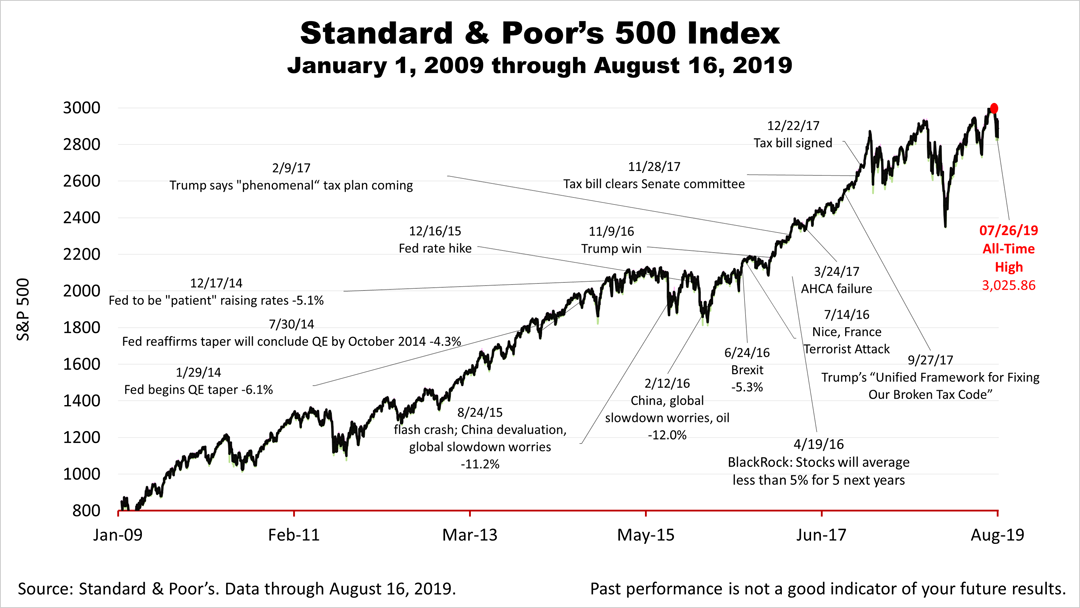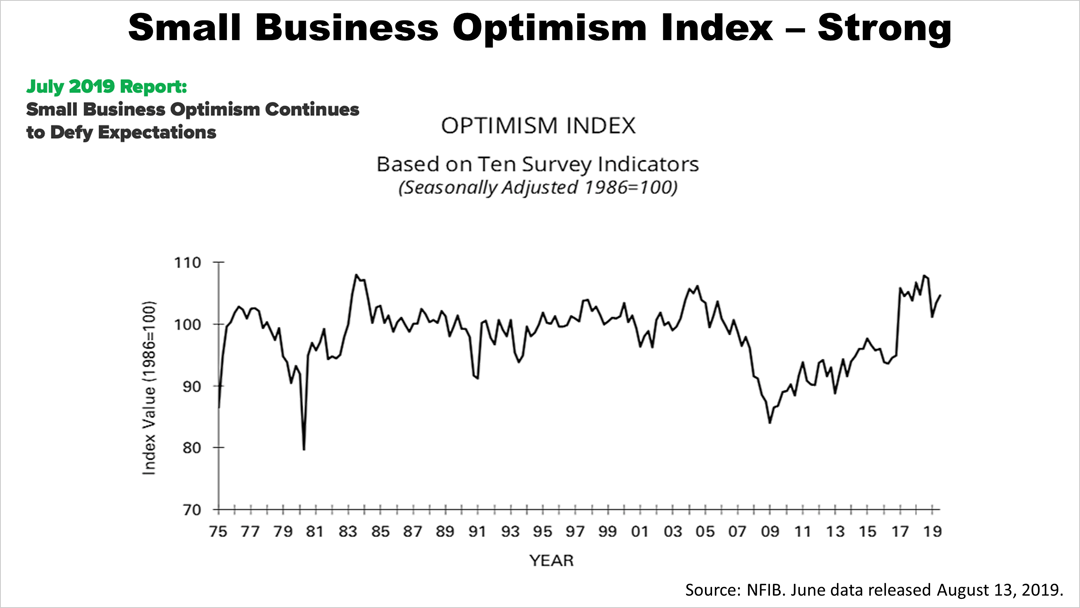A Prudent Perspective On Recent Volatility
Published Friday, August 16, 2019 at: 7:00 AM EDT
Fears of a recession caused a 2.9% price plunge on Wednesday but the Standard & Poor's 500 index rebounded sharply by Friday on news of strong retail sales in July and closed the week at 2888.68, less than 5% from its all-time high.
Retail sales — excluding gasoline because of their volatility — surged 3.7% in the 12 months through July, following its 3.8% spike in June and 3.1% rise in May.
Since 70% of U.S. economic activity comes from consumers, the continued strength in retail sales dampened fears of a recession.
You can't have a recession if consumers are spending like this!
Meanwhile, the National Federation of Independent Businesses' index measuring small-business owner optimism, released on August 13th, remained near its 44-year high.
Small business generates about 60% of new jobs. With business owners so optimistic, a recession is unlikely.
Recession fears and market volatility are widely attributed in the press to the inversion of the yield curve. But the news reports are not written from the perspective of a prudent financial professional.
On Wednesday, the three-month Treasury-bill yielded more than a 10-year Treasury bond. In the past, when short-term yields are higher than long-term yields, when investors are not rewarded for taking the risk of owning long-term bonds, it's signaled the onset of a recession.
However, it may be different this time. The yield curve inversion on Wednesday may not be a reliable indicator in current economic conditions. While the yield curve has been a fairly reliable signal of a recession in the past, this time the U.S. yield curve is influenced by an unprecedented condition: negative yields in Europe and Japan.
Negative yields in Europe and Japan are depressing yields on long-term U.S. bonds, causing the inversion in U.S. yields. The inversion makes it prudent for investors to expect lower returns on fixed-income portfolio allocations in the years ahead, but it does not mean the U.S. is headed for a recession.
This article was written by a veteran financial journalist based on data compiled and analyzed by independent economist, Fritz Meyer. While these are sources we believe to be reliable, the information is not intended to be used as financial or tax advice without consulting a professional about your personal situation. Tax laws are subject to change. Indices are unmanaged and not available for direct investment. Investments with higher return potential carry greater risk for loss. No one can predict the future of the stock market or any investment, and past performance is never a guarantee of your future results.
This article was written by a professional financial journalist for Preferred NY Financial Group,LLC and is not intended as legal or investment advice.
An individual retirement account (IRA) allows individuals to direct pretax incom, up to specific annual limits, toward retirements that can grow tax-deferred (no capital gains or dividend income is taxed). Individual taxpayers are allowed to contribute 100% of compensation up to a specified maximum dollar amount to their Tranditional IRA. Contributions to the Tranditional IRA may be tax-deductible depending on the taxpayer's income, tax-filling status and other factors. Taxed must be paid upon withdrawal of any deducted contributions plus earnings and on the earnings from your non-deducted contributions. Prior to age 59%, distributions may be taken for certain reasons without incurring a 10 percent penalty on earnings. None of the information in this document should be considered tax or legal advice. Please consult with your legal or tax advisor for more information concerning your individual situation.
Contributions to a Roth IRA are not tax deductible and these is no mandatory distribution age. All earnings and principal are tax free if rules and regulations are followed. Eligibility for a Roth account depends on income. Principal contributions can be withdrawn any time without penalty (subject to some minimal conditions).
© 2024 Advisor Products Inc. All Rights Reserved.




